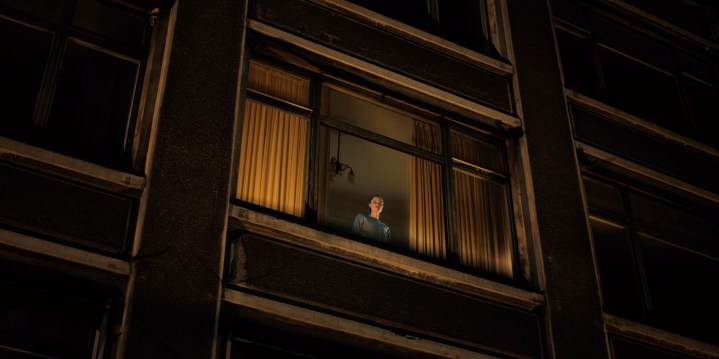When the Roman poet Juvenal asked, in so many translated words, “Who watches the watchers?” he was talking about infidelity. But the question has taken on multiple usages across the lexicon in the centuries since. Watcher, a sightly and sight-oriented exercise in mounting suspense from director Chloe Okuno, builds a whole movie on top of it. Here, voyeurism is a two-way street, where the watcher becomes the watched and vice versa. The defining image of the film is a figure, obscured by distance and drapes, peering out from a window across the way, inviting the very scrutiny in which he’s surreptitiously indulging.
Fledgling expat Julia (Maika Monroe) has been in Bucharest for only a few hours when she first spots the peeping tom. She’s just moved there from New York with her husband, Francis (Karl Glusman), whose family is from Romania; the prodigal son has returned for a lucrative new job in … maybe marketing, the movie barely clarifies. It’s not the easiest transition for Julia, who doesn’t speak the language (the dialogue not in English goes shrewdly un-subtitled, to forge some instant identification with her) and has no friends in this new city she explores alone during the long hours Francis is at work. Their condo is swanky but a little too vast, with big windows that render her private life public.
Okuno, making her feature debut after a run of buzzed-about shorts (including one of the better segments in last year’s horror anthology V/H/S/94), establishes a sense of surveillance immediately, cutting to the probing eyes of the cab driver on the commute from the airport. The credits roll over a long shot of Julia and Francis christening the couch in their spacious new living room, as the camera pulls back and back, revealing just how clearly the rest of the world can see into their love nest.

The script, written by Zack Ford and then rewritten by Okuno, proceeds at a foreboding crawl to convey how gradually Julia’s fears grow. At first, she second-guesses them. Is someone actually watching her, or does the big, international move just have her rattled? But then there’s news of a serial killer on the loose, a lunatic dubbed The Spider who lobs women’s heads clean off. Just because you’re paranoid doesn’t mean they’re not after you.
It’s nice to see Monroe back in the terror business nearly a decade after she established herself as a bewitching scream queen of modern horror, headlining the twin John Carpenter homages of It Follows and The Guest. She has a dreamy restlessness that feels almost fatalistic, as though her characters were always conjuring danger out of the ether to combat their boredom. It’s the perfect aura for a thriller that’s slow to refute its heroine’s self-doubts. Monroe plugs us into Julia’s seesawing concern — the way she initially wrestles with the possibility that her mind might be playing tricks on her. Bucking current trends in therapeutic genre fare, Okuno supplies her with only a whisper of backstory. All we really learn is that Julia used to be an actress — a job, not incidentally, that can leave someone feeling uncomfortably exposed.

Watcher recognizes its place on a venerated continuum of stalker stories. There’s a little Rear Window in its slow pans across the glass surfaces of neighboring architecture, and a lot of the archetypal “Hitchcock blonde” in Monroe’s sometimes wordless performance. Genre junkies will catch hints of the paranoid thrillers of the 1970s and the Italian giallo fare of the same period. (The score by Nathan Halpern keeps flirting with synth menace, though its ominous pings don’t quite blossom into a Goblin-like symphony.) But Okuno’s style, clean and effectively direct, never feels plagiaristic or particularly ostentatious. And it’s both narratively strategic and rather pointed that she resists the siren call of an ogling Jason Voorhees POV, refusing to frame Monroe through the eyes of a killer. Okuno wants to keep us guessing on how real the threat is, while also breaking from the male gaze that’s so uncritically adopted by so many films of this ilk.
Does the movie indict its own uncertainty? As the plot inches along, Julia stops casting suspicion upon her suspicions. She knows something is wrong. But the more certain she becomes, the less her concerns are taken seriously by the police, the neighbors, even Francis, whose persistent attempts to quell her fears go from comforting to dismissive right quick. (He’s like a politely undermining millennial upgrade on John Cassavetes’ careerist husband in Rosemary’s Baby.) Watcher becomes a kind of gaslighting story, a portrait of the way a woman’s recognition of danger can be ignored, minimized, and subtly coded as hysteria. You don’t have to strain to see the parallels between its fictional horror and the big headline news of the week.
But Okuno leaves all that bubbling under the surface. Theme never hijacks tension in Watcher, which is content to let meaning emerge organically from the familiar cat-and-mouse games of its slender genre plot. There’s nothing in this movie you haven’t seen a version of before; it packs few big surprises. But a payoff does arrive, rewarding viewers’ patience with its patient storytelling. Never mind that you’ll know the face of evil when you first see it, a good half-hour before Okuno indulges our confirmation bias. This is a film about identifying and responding to warning signs, even when everyone around you insists they’re not there. Why shouldn’t the audience, the third watcher of the tile, be made part of that equation?
Watcher is now playing in select theaters and available to rent digitally. For more reviews and writing by A.A. Dowd, visit his Authory page.



